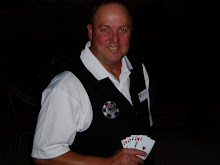This event is one of the few times players get to play old fashioned Draw Poker albeit, the lowball version. In this incarnation, not only do the players strive to make the lowest ranking poker hand (2,3,4,5,7 with no flush), they are allowed three draws to achieve it with a betting round after each one. The game is played with a limit structure utilizing a button with Small and Big Blinds. The first two rounds of betting, before and after the first draw, are at the level of the Big Blind followed by betting rounds at double that amount after the second and final draws.
While waiting for the tournament to begin a player, a Mr. Wachtel I believe, walked up and offered Frank Kassela a "last longer" bet for $2000 which Frank happily agreed to, the qualifier being that the winner must finish "in the money" in the tournament in order to collect.
At this tournament, I also had the pleasure of dealing to David Sklansky, author of several of the foremost books on poker and its strategies. During a pause in the action I asked the grey bearded poker authority why 5 Card Draw High wasn't in the mix of tournaments at the Series. His amusing and curious answer was that it used to be a bracelet event, however, the player who last won it was so good that they decided that due to a lack of competition they would simply discontinue the event.
 |
| David Sklanski, winner of 3 WSOP Bracelets and the last player to win a bracelet for 5 Card Draw High (1982) |
Follow up note: Neither Kassela nor Wachtel finished in the money in the 2-7 Triple Draw.





 - covered by everyone (5.84% to win main pot)*
- covered by everyone (5.84% to win main pot)*


 - covered by everyone but Ewing (22.01% to win main pot)*
- covered by everyone but Ewing (22.01% to win main pot)*


 - covered by Freitez and Alioto (27.47% to win main pot)*
- covered by Freitez and Alioto (27.47% to win main pot)*


 - covered by Alioto (21.42% to win main pot)*
- covered by Alioto (21.42% to win main pot)*


 - (19.7% to win main pot)*
- (19.7% to win main pot)*

 . Schaff was the only one with a spade draw, and Freitez hit two pair. The
. Schaff was the only one with a spade draw, and Freitez hit two pair. The  on the turn gave Schaff a flush and Freitez a set of fours. He could scoop the whole thing if he hit a boat. The river was a total blank - the
on the turn gave Schaff a flush and Freitez a set of fours. He could scoop the whole thing if he hit a boat. The river was a total blank - the  . Schaff took the main pot and the smaller side pot, eliminating Ewing. Freitez took the rest, knocking out Patel. Alioto started shouting at the floor about needing to pay off an extra 20,000 to Freitez that wasn't in the pot. Finally the floor quieted him, the dust settled, and the chips were restacked.
. Schaff took the main pot and the smaller side pot, eliminating Ewing. Freitez took the rest, knocking out Patel. Alioto started shouting at the floor about needing to pay off an extra 20,000 to Freitez that wasn't in the pot. Finally the floor quieted him, the dust settled, and the chips were restacked.
























